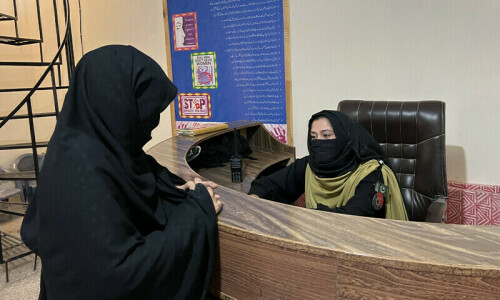LOWER DIR: Speakers at a seminar held here on Wednesday stressed on conducting geological surveys to identify vulnerable locations and building disaster-resilient communities and institutions to help minimise the effects of the frequently occurring natural calamities due to the climate change phenomenon.
The seminar was held at the Shaheed Benazir Bhutto University, Sheringal (SBBUS), Upper Dir, to mark the International Day for Disaster Risk Reduction. It was jointly organised by Glof-II project and the Provincial Disaster Management Authority (PDMA).
The day is observed to promote a culture of disaster reduction and risk awareness globally. The speakers said climate change appeared to be a macro driver leading to changes in environment, worsening the existing vulnerabilities, and could potentially lead to increased rural outmigration.
On the occasion, PDMA director disaster risk management Zuhra Nigar stressed on enforcement of building codes policy, conducting geological surveys to identify vulnerable locations and multi-hazard vulnerability assessment across the province.
She added risk and uncertainties were increasing in the region due to climate change, greater frequency of extreme climatic events, extreme minimum and maximum temperatures and increased incidence of temperature-influenced disasters and pests.
Glof is another emerging phenomenon, observed especially in Chitral district, which has a glacial cover of 4,000 square kilometres, the second largest after Gilgit-Baltistan, she pointed out.
Ms Nigar said incidents of Glof had posed some serious threats and challenges to the mountainous communities in the far-flung areas in recent times.
Glof-II project’s provincial coordinator Fahad Bashir Bangash said the seminar would enable the participants to gain a deeper understanding on the impact of climate change-induced disasters, and the importance of building disaster-resilient communities and institutions.
Under the Glof-II project, he said, latest equipment and other instruments had been provided to different departments for building their capacity. He said the project had been working in eight vulnerable valleys of Upper Dir, Lower Chitral, Swat and Upper Koshistan districts.
Addressing the seminar, SBBUS Vice-Chancellor Prof Rehmat Ali Khan highlighted the memories of the disasters in the recent past, which were not only affecting the human lives but also severely damaging the country’s socioeconomic fabric.
Published in Dawn, October 14th, 2021











































Dear visitor, the comments section is undergoing an overhaul and will return soon.